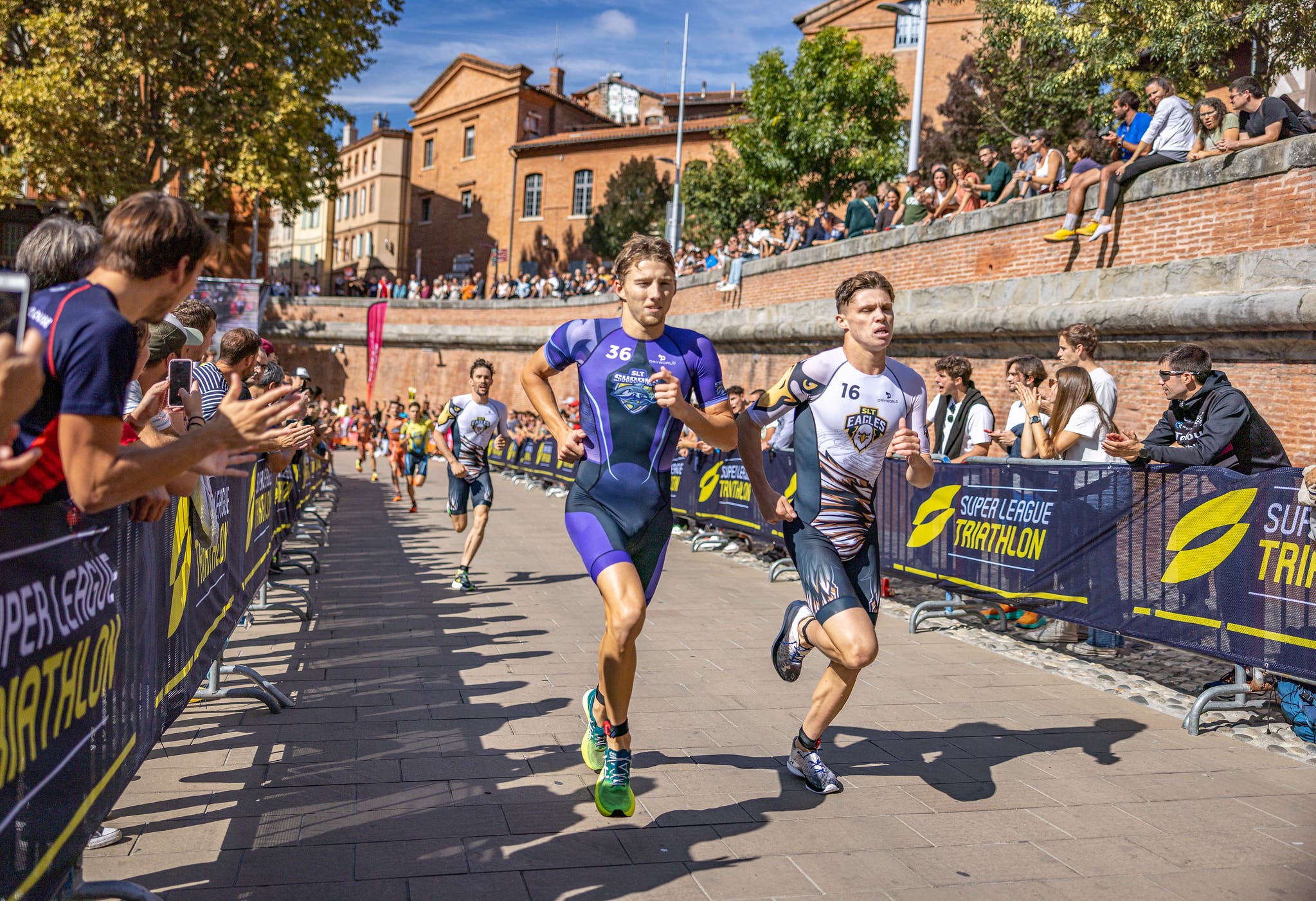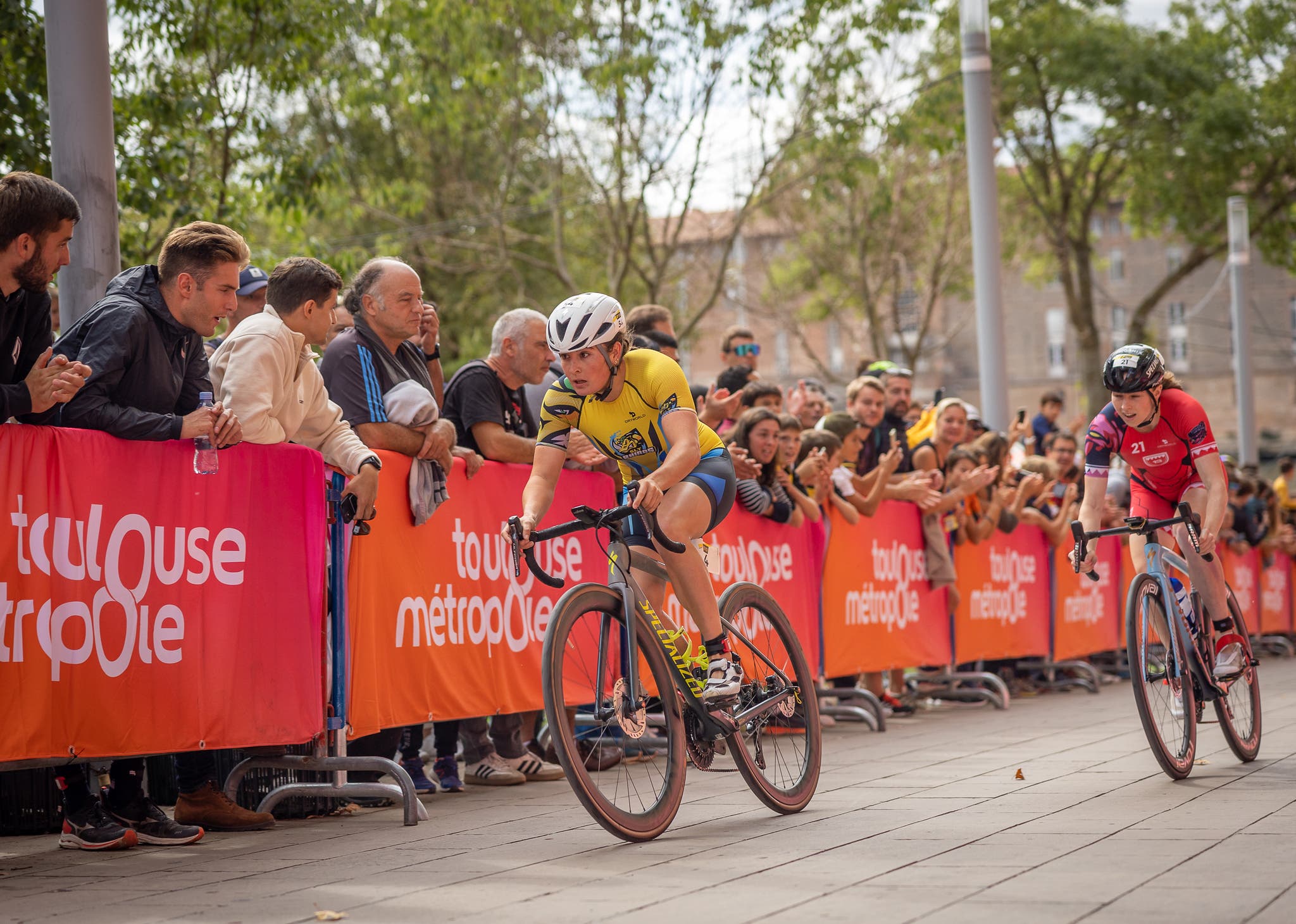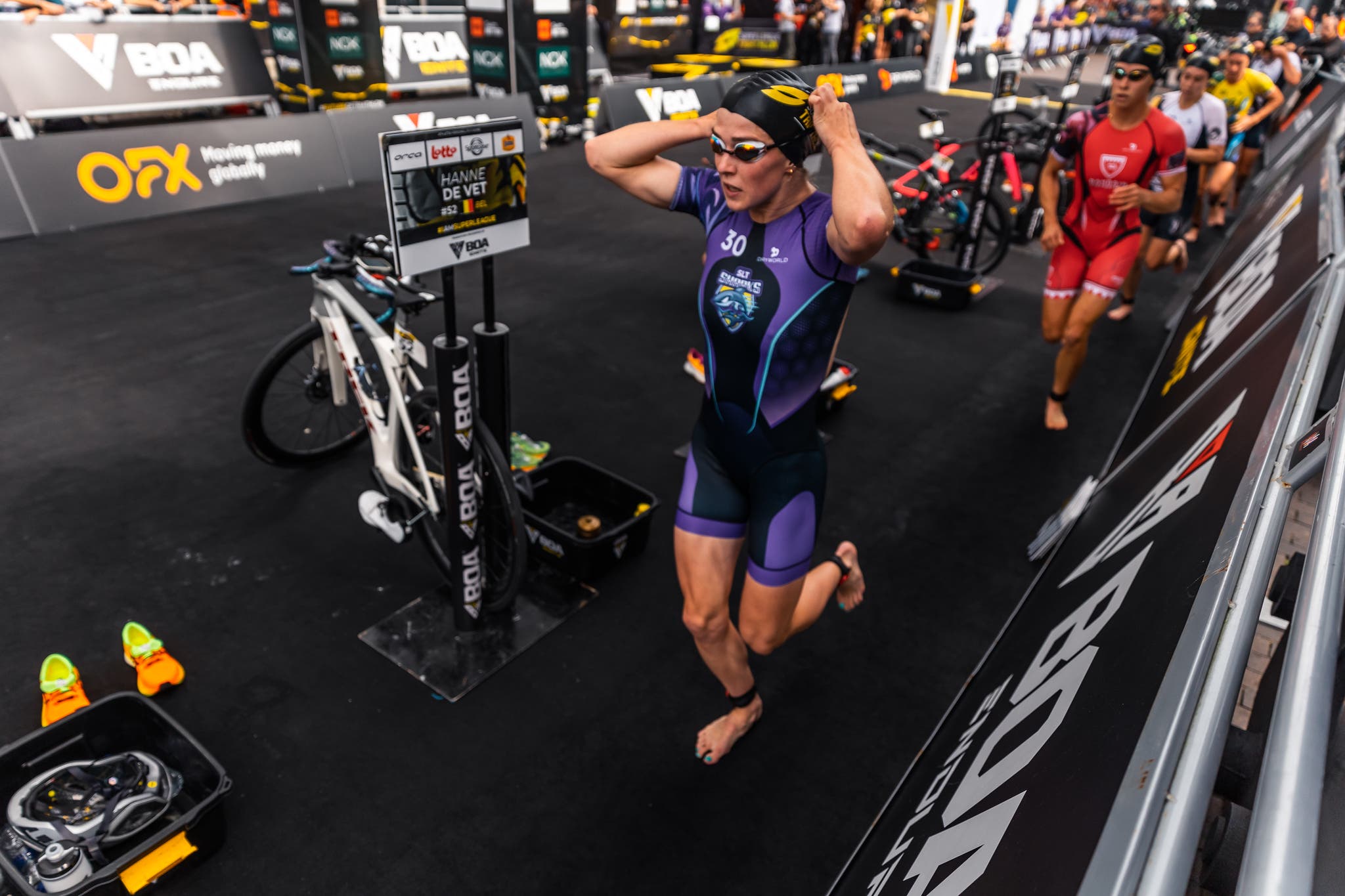How Do Future Olympians Get Faster? Getting Slapped Around By The Best Helps.

(Photo: Super League Triathlon)
In only its fourth season ever, Super League Triathlon (“SLT”), is making headlines for its innovative format and big prize purses. Olympic and Commonwealth medalists, Georgia Taylor-Brown and Hayden Wilde were crowned overall Super League champions, banking six-figure paychecks along the way. But it’s perhaps the athletes further down the roster who are earning the most – not just in pay, but in valuable racing and life experience.
Super League Triathlon is far from a “winner takes all” race series, as athletes up and down the overall standings are rewarded financially for individual sport (swim, bike, run) primes as well as team performances over the course of the season. Indeed, more than 40 short-course triathletes earned prize money from the five race Championship Series. This included many up-and-coming and U23 athletes that could well be the “future” of triathlon as we look ahead to the Paris or Los Angeles Olympic Games in 2024 and 2028, respectively.
Want to see all the Super League action from the series? Outside+ members can watch all the races on demand with Outside Watch, plus multiple Ironman and 70.3 races from the 2022 season. Not a member? Become one today for only $2.99 per month.
“Put myself in the front of the race, stick my nose in it and hang as long as I can.”

Chase McQueen is a 24-year-old American with ambitions to make the US Olympic team in 2024. Last year, he made his debut in World Triathlon Championship Series (“WTCS”) racing, the highest level of World Triathlon short-course racing.
“I’m still new to the top level of racing in World Triathlon – I raced my first World Series Championship event last year in Leeds,” says McQueen. “I’ve done maybe 7-8 WTCS races in my career so far and less than that in World Cups. Racing is the single biggest reason why I wanted to do Super League…why not throw myself in at the deep end as much as I can to just see what it takes to compete at this level?””
McQueen recollects how he felt during WTCS events in 2021: “I’d look around and see faces like Hayden [Wilde] and Jonny [Brownlee] and I’d wonder if I belonged. I’d give them an edge because of their names, and that’s never a good spot to be in when you’re racing.”
In contrast, in Super League racing, McQueen has tried a more aggressive style of racing: “I told myself that whatever I do, I’m going to put myself in the front of the race, stick my nose in it and hang as long as I can. Those guys have taught me to be aggressive and never give an edge to anyone.” As an interviewer, it’s not lost on me that McQueen is now referring to “those guys” by their first names, a sure sign of increased familiarity and ease in their presence.
All the races, all at once
Gaining race experience and developing race craft was also the reason Daniel Dixon, a 20-year-old triathlete from Great Britain, opted to pursue Super League’s Championship Series, rather than racing World Triathlon events. The allure of the Championship Series was the frequency of racing, since it comprises three back-to-back races within each round of racing.
“That’s 15 races against some of the best guys in the world. Where else are you going to get that ability to race so many times?” While the British Federation might have wanted Dixon to do the “Asia Trip,” as they colloquially called the series of World Cup races taking place in Asia September-November 2022, Dixon didn’t want to chase points. Instead, the big focus was on improving his race strategy..
“It’s subtle things within the race… but you’re constantly having to make decisions,” says Dixon. “It’s technical elements like coming around a corner where someone has crashed so you have to adapt quickly to get back in the race; or the multiple transitions in each round of Super League so you’re practicing transitions at speed and under pressure in each race.”
In contrast, there’s only one race and one chance every few weeks in World Triathlon, therefore fewer opportunities to make decisions and hone critical triathlon skills at race pace and race intensity.
How to adapt and overcome

Another British athlete, Kate Waugh, is 23 years old and has learned to “expect a bit of the unknown” with SLT racing. Less than 24 hour before the Super League finale in NEOM, athletes still hadn’t see the race site – and Waugh says the season was full of learning experiences like that. “You learn quickly that you can’t control everything and just need to go with the flow.”
Waugh’s concern for previewing the race course was related to the technical nature of most SLT races. “The bike courses are always super technical in Super League so it’s definitely improved my bike handling,” she says, adding that she had already noticed the difference when she raced WTCS Cagliari in early October. “It was weird because I felt so comfortable in the corners, the road felt so wide, and I felt in control. I never would have felt that way without Super League racing.”
Jeanne Lehair races for Luxembourg and has more than 10 years of World Triathlon experience having come up through the European youth and junior ranks. However, she’s still experiencing triathlon firsts courtesy of the SLT series. “In the first race in Toulouse, it was just me and Georgia Taylor-Brown on the bike.” She laughs. “I was like, what the hell?”
While Lehair knows that she should probably take confidence from being at the front of the race in a breakaway with the Olympic Silver medalist, her mind often turns more negative: “I speculated that it was the first of three races, so she was taking it easy while I was full gas but at least I did it!” Lehair is not sure if she will ever be in a breakaway with Taylor-Brown, again but she’s happy to have checked it off her bucket list.
A pro’s perspective
Teams and team managers were introduced to Super League racing in 2021. At first glance, the manager opportunity appears to be a bit of a boondoggle with recently retired professionals like Tim Don and Ronnie Schildknecht, gallivanting around the world on an all-expenses paid trip. However, the athletes welcome the tactical and morale support they provide.
McQueen races for the Sharks, managed by Michelle Dillon and Stuart Hayes. “It’s cool getting to learn from them as they were both amazing athletes but their perspective on the sport has also been eye-opening for me.” He explains that the couple are often urging the team members to relax, have fun and enjoy the racing. “At some point our careers are going to be over, and we’re going to wish we’d done some things differently.”
A school of professional triathlon

As much as the athletes reflect on the value of the race experience with SLT, they are also quick to praise the entire experience. Waugh sums it up simply: “You’re treated like the professional athlete that you dreamed of being as a kid.” The SLT team arranges travel and catering for the athletes and race-related staff, which includes physiotherapists and bike mechanics, as they move between venues over the course of the Championship Series. Not only does that bring the athletes together, but it also connects the athletes with the race staff and brings a deeper understanding of what it takes to put on each event. In Waugh’s words, “you feel part of something so much bigger than the race, and that’s what makes it so special.”
Dixon concurs. “Super League is like a school of professionalism… you aren’t getting that treatment in World Triathlon and I’m with the British Federation, one of the best in the world.” Dixon adds that SLT’s focus on taking care of all the ‘administrative’ details, including food, accommodation and travel removes a lot of stress, enabling the athletes to focus on the race.
“How many other races do you go to where your only worry is competing?” he asks rhetorically. “How many times do you have to worry about booking flights to the middle of nowhere, transfers from the airport, accommodation, wondering where you are going to get food? Super League allows me to have utter focus on racing.”
Waugh, like Dixon, is preparing for the U23 World Championships in Abu Dhabi at the end of November. Besides the pure racing experience, she also appreciates the exposure that SLT racing offers. “It’s definitely a modern style of racing where they use social media platforms really well,” she says, “it’s so cool to be a part of it and gain that exposure that I just wouldn’t get competing in World Triathlon events.”
The media exposure and connection with the fans has also been a game changer for McQueen. “I believe Super League Triathlon is the future of triathlon,” he remarks, quickly adding, “I’m not taking the piss when I say that.”
While it’s a non-traditional format, McQueen sees that SLT is bringing a new audience to triathlon. “When you turn up to an event like Toulouse and the place is absolutely rammed with fans, that’s probably one of the coolest events I’ve ever been a part of.” He still plans to compete in World Triathlon and has hopes of being selected for Team USA at the Olympic Games, but he is also excited about Super League thanks to the fan engagement and exposure the team is driving with their fresh approach to the sport.